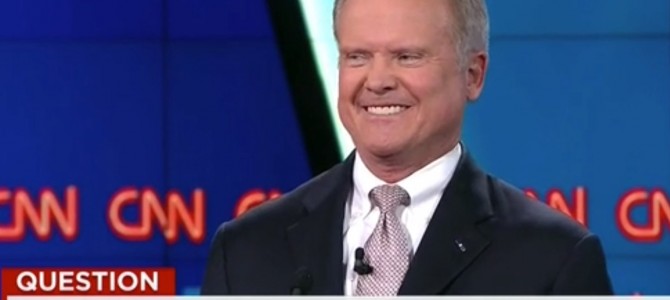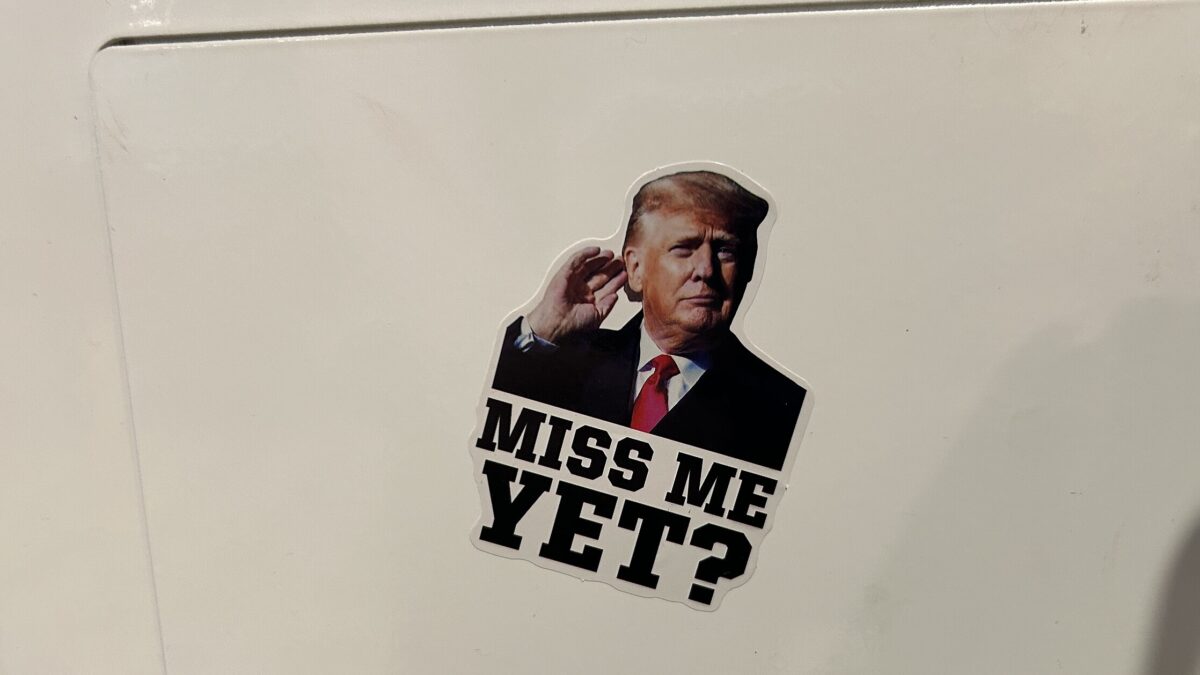
Earlier today Jim Webb spoke at George Washington University. Webb ran for the Democratic presidential nomination last year, and has previously served as a U.S. senator from Virginia, was secretary of the Navy under Reagan, and is known for his military service and contributions as a novelist and historian of the Scots-Irish. A Naval Academy graduate, Webb was awarded the Navy Cross, the Silver Star, and two Bronze Stars for his conduct in combat during the Vietnam War. He received two Purple Hearts for injuries he sustained while in combat.
According to Yahoo News reporter Jon Ward, the man who introduced him said Trump should pick Webb as his secretary of defense or secretary of state.
The inside-the-beltway brigades have been bandying about former New York City mayor Rudy Giuliani and former UN ambassador John Bolton for secretary of state. For his part, Webb never answered questions at GWU even about whether he’d consider serving in a Trump administration. While he wouldn’t reveal who he voted for (“My vote is my business. This is America.“) he said, “I would like to salute Donald Trump for his tenacity and for the uniqueness of his campaign.”
Giuliani and Bolton have been curious suggestions for a candidate who spoke so strongly against an aggressive foreign policy with unclear goals. As Dave Weigel at the Washington Post noted, the rumors had one senator and supporter of Trump loaded for bear:
Sen. Rand Paul (R-Ky.), a newly reelected member of the Senate Foreign Relations Committee, said this morning that he was inclined to oppose either former U.N. ambassador John Bolton or former New York City mayor Rudy Giuliani if they were nominated for secretary of state.
‘It’s important that someone who was an unrepentant advocate for the Iraq War, who didn’t learn the lessons of the Iraq War, shouldn’t be the secretary of state for a president who says Iraq was a big lesson,’ Paul said in an interview this morning. ‘Trump said that a thousand times. It would be a huge mistake for him to give over his foreign policy to someone who [supported the war]. I mean, you could not find more unrepentant advocates of regime change.’
Paul’s position on the Foreign Relations Committee makes his opposition particularly meaningful, but the key for Trump will be to figure out a way to keep his coalition of supporters content. One sector of that coalition is the one that includes those who were attracted to what they believed his foreign policy to be — restraint about when and where the United States fights wars coupled with a clear path to victory when we do.
If that is Trump’s position, Giuliani and Bolton would be odd choices, and Paul fleshed out his opposition here. Webb, however, would be a fine pick. Ward observed that many of Webb’s talking points at GWU “match up quite well with objections to Bolton made by Rand Paul today.” They also match up well with things Trump said on his campaign to victory, such as his comment that “NATO expansion has created new environment in terms of how it works…Many new members are clearly protectorates rather than allies.”
As my colleague David Harsanyi wrote more than a year ago:
He refuses to offer soundbites that will please anyone on foreign policy. He’s the only candidate to talk about abuses against privacy from the last administration and point out that this president is guilty of abuses of executive power. He was the only candidate on the stage in Las Vegas who did not selectively embrace the Constitution to make a point about some pet political issue.
Webb detests politics just like the rest of us. You can see it in his eyes. He hates campaigning. He doesn’t like raising money. Last night, Webb exhibited contempt for the bunkum that poured from mouths of people who can claim that climate change is the most pressing problem mankind faces. And I have little doubt he would have been similarly unimpressed by most of the platitudinous answers Republicans offered in their debates.
He also had one of the most memorable moments of the Democratic primary. Asked about the enemies they were most proud of, Lincoln Chaffee said the coal lobby, Martin O’Malley said the National Rifle Association, Hillary Clinton said Republicans, and Sanders said Wall Street. Here’s what Webb said:
Even better, this awesome comment went over like a lead balloon with many political journalists.
Webb wasn’t known for his managerial wisdom while serving Reagan, and he ended up quitting in opposition to Reagan’s budget cutting. In addition to their foreign policy views, both Trump and Webb are hotheads. At best, you might say they’re both plain speakers. Webb spoke about his foreign policy vision last year to an audience at George Mason University.
Evan Gottesman wrote a helpful summary at The National Interest.
“Our country is in need of a clearly articulated foreign policy statement,” Webb boldly declared to an audience at George Mason University.
In his speech today, Webb reiterated his opposition to wars that don’t serve the interests of the country or its global position, mentioning his opposition to the war in Iraq. He said the United States should consider a nation’s stability, aggression, and treatment of citizens before it aligns with them. He noted the need to honor treaty obligations, citing the threat of Chinese aspirations in the South China Sea. He noted the need to maintain our technological edge in weapons systems, and the importance of national self-defense in the fight against Islamist terrorism. He also emphasized the need for Congress to recover its power in war-making, condemning executive overreach regarding activity in Libya and Iraq.
These views from his George Mason speech are the same views he’s been espousing for decades, and many believe the country would have been better off listening to him. His anti-Gulf War essay from 1990 sounds these same themes and warns about the downsides of a permanent military presence in the Mideast:
The debate over our role in the Persian Gulf crisis has focused on national, rather than specific military goals. The fundamental questions, upon which all others inevitably rest, have not been addressed. Why did we send such a huge contingent of ground troops in the first place? And under what conditions are we going to use them or bring them home?
Answers are not forthcoming. Military officials intimate that the question would expose tactical options. Administration officials talk in vague terms: Defense Secretary Cheney is telling us to prepare for a commitment that may take years. Others have been quoted as saying we may be there for a decade. At the same time we are being reassured, amidst many loud calls to initiate a war with Iraq, that the U.S. military commitment is wholly defensive.
He ends:
Too much is at risk, and too many questions remain for this buildup to continue without the Administration clarifying its direction. And if offensive action is in the cards, it should be taken only after the President receives a declaration of war from the Congress.
He was similarly cautious about the second Gulf War, writing in the Washington Post:
Despite the efforts of the neocons to shut them up or to dismiss them as unqualified to deal in policy issues, these leaders, both active-duty and retired, have been nearly unanimous in their concerns. Is there an absolutely vital national interest that should lead us from containment to unilateral war and a long-term occupation of Iraq? And would such a war and its aftermath actually increase our ability to win the war against international terrorism?…
America’s best military leaders know that they are accountable to history not only for how they fight wars, but also for how they prevent them. The greatest military victory of our time — bringing an expansionist Soviet Union in from the cold while averting a nuclear holocaust — was accomplished not by an invasion but through decades of intense maneuvering and continuous operations. With respect to the situation in Iraq, they are conscious of two realities that seem to have been lost in the narrow debate about Saddam Hussein himself. The first reality is that wars often have unintended consequences — ask the Germans, who in World War I were convinced that they would defeat the French in exactly 42 days. The second is that a long-term occupation of Iraq would beyond doubt require an adjustment of force levels elsewhere, and could eventually diminish American influence in other parts of the world.
This is the best version of Trump’s foreign policy, and one he consistently discussed during campaign speeches and debates. Jim Webb for secretary of defense.









